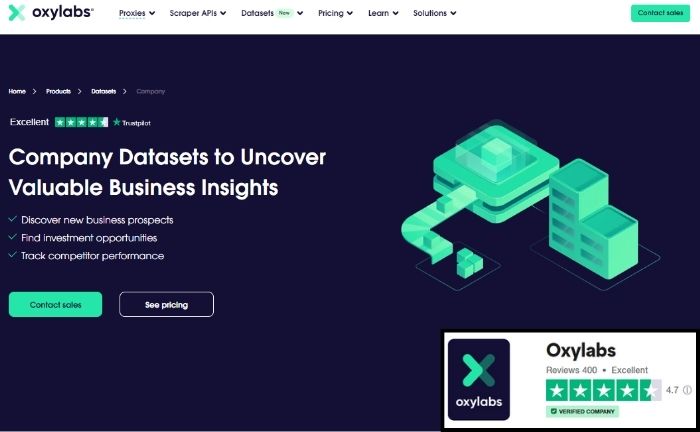Companies that collect, organize, and share vast data are pivotal in exploring the enormous digital cosmos. Just as astronomers map the night sky, these dataset companies catalog and distribute constellations of information, creating atlases that open pathways to discovery. At the heart of this revolution are giant data repositories, which provide foundational material for artificial intelligence and data analytics, driving progress forward.
Dataset companies go beyond simple collection and storage and act as architects. They build bridges that enable researchers and companies to travel between domains. They offer tools and services that leverage the value of the information. Mining the wisdom in these vast digital collections fuels evidence-based decision-making and creates transformative innovations. Sectors such as healthcare, commerce, and mobility benefit from data, accelerating technological progress in a generation of information abundance.
What are dataset companies?
Dataset companies play a critical role in the collection, management, and distribution of data from a wide variety of sources in a way that is accessible to all. They collect large amounts of data from various sources, including government records, scientific publications, social networks, and sensors. They organize and store vast amounts of structured and unstructured data, making it easily accessible and critical data available to authorized users through licensing or subscription models.
In addition, dataset companies are developing tools that help people explore, cleanse, and transform data. They provide consulting services that unlock the value of data for their clients. These companies act as guardians and facilitators of data access and are essential to advancing science, technology, and business.
What are the types of datasets?
Datasets form the foundation of analytical efforts, influencing the structure of the organization and information processing. Dataset companies act as carriers of raw information, and each dataset represents a unique vessel with its distinctive characteristics and functionalities.

Structured dataset
A type commonly used in various data analysis fields is organized in a tabular format, consisting of rows and columns that follow a predefined structure. The data in these tables is typically stored in CSV, Excel, or relational databases, allowing for easy data manipulation and analysis. This dataset makes it possible to keep vast amounts of information structured and organized, making it easier to access and analyze for further insights.
Unstructured dataset
Many datasets follow a structured format, typically organized in tables that make it easier to analyze and process. However, some datasets do not fit into this category and are known as unstructured datasets. These datasets do not follow a predefined structure. They can be made up of free text, images, audio, video, PDF documents, and more.
Due to their lack of a system, unstructured datasets are usually more challenging to analyze and process. This is because the data must be dealt with in its raw form, making it harder to extract insights and patterns. Additionally, unstructured datasets require advanced tools and techniques to extract relevant information.
Semi-structured dataset
Semi-structured datasets are unique datasets that combine the characteristics of both structured and unstructured datasets. The data is partially structured and may contain tags or metadata to provide additional structure. Semi-structured datasets often store complex data that does not fit neatly into a traditional structured format.
Examples of semi-structured datasets include XML, JSON, or HTML files. These file formats allow more data storage and retrieval flexibility, as they do not require a rigid schema or predefined structure. Additionally, semi-structured data can be easily transformed into structured data using specialized tools and techniques.
Why do companies use datasets?
Companies rely heavily on collecting and using datasets to improve operations and make informed decisions. For example, in the financial sector, datasets can be used to analyze spending patterns, forecast economic trends, and assess financial risks. A dataset may include past data on transactions, interest rates, and market conditions, allowing businesses to make informed financial decisions.
Datasets are critical for medical research and treatment development in the healthcare industry. Medical datasets can contain detailed patient information, test results, and medical records. Analyzing this data on a large scale could reveal epidemiological patterns, identify risk factors, and improve treatment effectiveness.
@mindfulluke How Important Is Data Set? #dataset #bitcoin #selfimprovement
In e-commerce, companies use datasets to understand customer behavior and personalize the shopping experience. An e-commerce dataset may contain data on user activity, product preferences, purchase history, and feedback. A dataset company can provide personalized recommendations, improve logistics, and anticipate market trends by analyzing this data.
Company datasets drive artificial intelligence (AI) and machine learning (ML). ML algorithms rely on data to learn and improve over time. For example, a technology company’s speech recognition dataset can train a system to understand and respond to verbal commands. The larger and more accurate the dataset, the better the system can recognize patterns and improve performance.
Which is the best company dataset?
Working with datasets involves more than just collecting vast data. It also addresses ethical and privacy issues. A company datasets must manage and use datasets, protect personal information, and comply with privacy regulations. So that’s why, at Allaboutcareers, we recommend Oxylabs as one of the company datasets to consider.
Oxylabs is a web scraping specialist known for its advanced proxy solutions and data collection services. Its comprehensive toolset includes a proxy rotator add-on, web crawler, scheduler, and custom analyzer. In addition to its web scraping expertise, Oxylabs is known for its ethical data collection practices. The company aligns with GDPR and CCPA regulations to maintain best practices. It is a proud member of the Web Data Ethical Collection Initiative.
Beyond tools and services, Oxylabs excels in data extraction, analysis, and delivery. The company’s data sets are invaluable, providing organizations with critical information to make informed business decisions. These datasets, available in standardized and customized formats, are designed to meet the client’s needs.
Not a minor fact: Oxylabs.io has 4.7 stars on Trustpilot with excellent reviews from users.

In addition, you can contact the experts for advice in any situation to help you understand how this wonderful data lab works. Without a doubt, Oxylabs is a trusted partner committed to providing solutions while maintaining the highest ethical standards in data collection.


